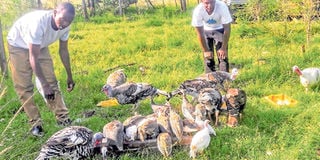Bird hobby turns into a mint

Titus Kiptoo and his brother, Mark on their farm in Uasin Gishu. He says he developed an interest in turkeys when he visited a friend in Elgon View estate, Eldoret, who told him about their advantages and benefits. PHOTO | PETER CHANGTOEK | NMG
What you need to know:
- The young farmer is pursuing a postgraduate diploma in customs revenue at the Kenya School of Revenue Administration.
- Coincidentally, one of his turkeys had just hatched, and he gave her the poults.
- He says pens for the turkeys and guinea fowls should have roosters. Geese prefer to lie on the ground.
- His biggest challenge is predation by stray dogs. The problem is critical, especially when no one is around. Chicks are the most vulnerable of the flock.
Titus Kiptoo, 26, began keeping ornamental birds as a hobby but it has turned out to be a profitable business.
“I developed an interest in turkeys when I visited a friend in Elgon View estate, Eldoret. She told me about their advantages. I bought two females at Sh3,000 each and borrowed a male from her, which I later bought,’’ says Kiptoo, who holds a degree in wildlife management from the University of Eldoret.
The young farmer is pursuing a postgraduate diploma in customs revenue at the Kenya School of Revenue Administration.
“When I went to Nairobi last year, I stayed with my cousin, whose neighbour kept turkeys, geese, guinea fowls and other birds. In December, she gave me four keets that were a week old,” he said.
Coincidentally, one of his turkeys had just hatched, and he gave her the poults.
“It readily accepted them. I began raising geese just two weeks ago. So far, I have three female and one gander. I expect eggs and goslings soon,” said the farmer, who lives in Merewet, some 20 kilometres from Eldoret.
Kiptoo started keeping turkeys as a hobby. When demand grew, he and his younger brother Mark saw it was an area they could exploit.
It did not take long before they increased the number of their turkeys to 30. Currently, they have 20 female turkeys, three toms, four adult guinea fouls and 34 keets. Kiptoo says an adult turkey sells for Sh3,000 to Sh4,500, depending on the sex, breed and size.
“Mostly, we sell day-old poults, each going for Sh300. A guinea fowl keet also goes for Sh300,’’ he says. Due to the high cost of feeds, Kiptoo and his brother at times prepare and mix theirs.
“We usually use maize germ, wheat bran and fish meal. We feed the birds in the morning, then allow them to roam freely for the rest of the day,’’ he added.
A REAL MENACE
He says pens for the turkeys and guinea fowls should have roosters. Geese prefer to lie on the ground.
While guinea fowls and geese are resistant to most poultry diseases, turkeys are prone to fowl pox and blackhead diseases.
On average, a turkey lays 10 to 20 eggs before becoming broody. “Turkeys are good at incubating eggs so I use them to hatch guinea fowl chicks,” Kiptoo said.
“Guinea fowls can lay many eggs before going broody. These ones began laying when they were six months old and they have not stopped.”
Kiptoo’s customers come from Narok, Eldoret, Kisumu, Nairobi and several other towns.
His biggest challenge is predation by stray dogs. The problem is critical, especially when no one is around. Chicks are the most vulnerable of the flock.
“Turkeys and guinea fowls like to roam freely and dogs can be a real menace. I once lost 10 turkeys to the dogs in a single day,” the farmer said. His advice to anyone intending to keep ornamental birds?
“Like any other business, there is a learning curve. One will need to be patient is he or she want to achieve success. Patience also pays,” Kiptoo said. His plan is to go large scale and keep other types of birds.
According to Dennis Kigiri, an animal expert at Egerton University, Njoro, anyone who would like to venture into turkey farming should ensure he has adequate feeds and gives the birds plenty of clean water every day.
“Water should be about body temperature to prevent turkeys from cold,’’ the expert said.
He adds that for the best quality meat, grains given to the birds should be at least 70 per cent maize. That should be done from the time the turkeys are 20 weeks old. “You should also allow the birds to feed on fresh pasture,” Kigiri advises.




